In Moscow in 1980, and in Los Angeles - four years later - the Cold War entered the Olympic arenas. Never in the history of the Olympics has politics so strongly left its mark on sports rivalry. Also, politicians' decisions have never deprived so many players of the chance to make history.
On October 23, 1973, the participants of the 75th session of the IOC in Vienna decided that the 1980 Olympics would be organized by Moscow. The very decision to award the most important sports event in the USSR capital had a symbolic dimension, as one of its competitors was the American Los Angeles.
Although it was realized that for Soviet politicians the Games would become a propaganda tool, fearing accusations of partiality and too much "pro-Westernness", the IOC upheld this decision . Success was announced in the USSR and socialist countries. For the first time in history, the Games were supposed to be on the other side of the Iron Curtain.
The Russians tried to keep the world informed about the progress of work. Foreign journalists were invited to Moscow with optimistic reports:the renovated Lenin was supposed to accommodate a record number of fans, the Olympic village looked to be the most modern of the existing ones, and the Muscovites themselves seemed to be open and civilized people.
Even CIA agents have reported that the work in the USSR is proceeding as planned. Everything indicated that the Olympic Games would bring relaxation on the East-West line. Perhaps they will be the field of final reconciliation. Half a year before the scheduled start, everything has shattered like a soap bubble.
Solidarity with Afghanistan
Christmas 1979 was not a peaceful one. When families gathered around the festive table in Polish homes, the war began in Afghanistan. Soviet troops crossed the border, starting a nearly ten-year conflict. Hardly anyone could have assumed then that that war would backfire against sport. For several years.
On January 4, 1980, in a New Year's address to the nation, referring to the Soviet invasion, US President Jimmy Carter said:
Although the United States would prefer not to withdraw from the Olympics, the Soviet Union needs to realize that its continued aggressive actions will threaten both participation by athletes and the fans' travel to Moscow.
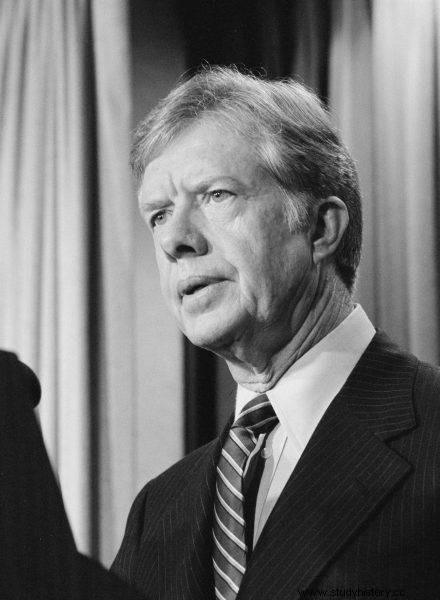
Carter's words were a warning to Brezhnev and his entourage. In this way, the politician criticized the Soviet actions in Afghanistan and announced further steps.
Carter's words were a warning to Brezhnev and his entourage. In this way, the politician criticized the Soviet actions in Afghanistan and announced further steps. The president's entourage also planned to introduce economic sanctions, including suspension of American wheat deliveries to the USSR. However, from an image point of view, such a solution could prove fatal:for farmers it could be associated with huge financial losses, and for the incumbent president - with the loss of their votes in the elections. And Carter had to care about the support as the polls at the time were not for him.
Political boycott
In late January 1980, an ultimatum was sent to the Kremlin from the White House: either the USSR would withdraw its troops from Afghanistan or the Americans would not appear at the Moscow Olympics. The threat of a boycott took real shape. But was it an effective political tool?
Four years earlier, representatives of African countries did not start in Montreal. In this way, they protested against allowing New Zealand to participate in the struggle, whose rugby players broke the international isolation of the racist South Africa by organizing a tour of the country. Only sport was lost to this boycott. The protesters, apart from publicity, gained nothing concrete.
Did Jimmy Carter actually think the boycott of the sporting event would make the Soviet army leave Afghanistan? Was it more about image issues? About polls? If, however, you said "A", you must say "B". The president has started the offensive.
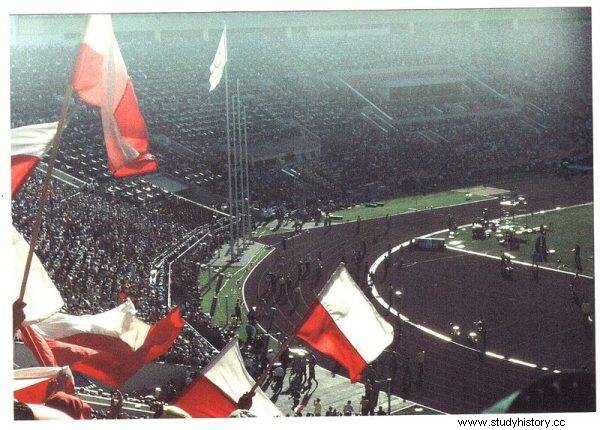
The United States held talks with other governments to force their National Olympic Committees to boycott as well.
In 1980, Robert Kane was president of the American Olympic Committee, and he was one of the first to feel the pressure of the president and the Congress behind him. Politicians threatened to stop the financial flow that flowed into the organization. They threatened that the American presence in Moscow could affect the country's security. Moreover, an effective media campaign made the public support for the boycott grow week by week - at its peak, Americans supported the president's actions. By design, the independent Olympic committee finally succumbed to pressure, and on April 12, 1980, it voted by voting that US athletes would not go to Moscow.
At the same time, the United States held talks with other governments to force their national Olympic committees to boycott as well. It was possible, inter alia, in the Federal Republic of Germany, Canada, Japan or in Muslim countries. The biggest failure of the Carter camp was the situation in Great Britain, where Prime Minister Margaret Thatcher supported the idea of a boycott but failed to influence the British Olympic Committee. Thus, the athletes from the Islands appeared in the capital of the USSR, winning twenty-one medals on the occasion.
On the other side of the curtain
Athletes from 63 countries did not start in Moscow. The absence of some of them was not due to the boycott; they simply lacked money. 81 teams took part in the event, including players from Poland. This number could have been smaller, but the USSR convinced the undecided, among others guarantees of free transport or accommodation for participants.
The socialist states began their preparations for the Games as early as the mid-1970s. Both for the USSR and the demolished people, this event was of special importance, to make the superiority of socialism over capitalism visible to the whole world . Not only athletes, coaches and the media were mobilized, but most of all the services. In their hands, sport has also become a political tool. Anyway, not the first and not the last time.
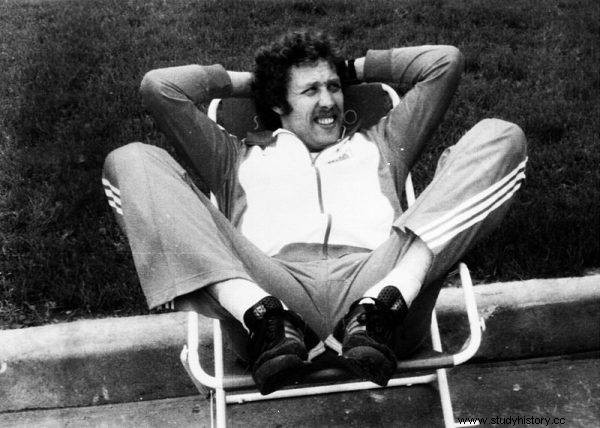
One of them was the pole vaulter Władysław Kozakiewicz, who showed the fans at the Łużniki stadium "wała" and for this gesture some observers wanted to take the Olympic championship from the Pole.
The Olympic Games in Moscow, which lasted from July 19 to August 3, 1980, had many sports heroes. One of them was a pole vaulter Władysław Kozakiewicz, who showed the fans at the Łużniki stadium "wała" and for this gesture some observers wanted to take away the Olympic championship from the Pole . Another was Bronisław Malinowski, who made up his several dozen meters behind Tanzanian Filibert Baya and won the 3000-meter steeplechase. The British, who opposed the boycott, enjoyed the starts of their prominent middle-distance runners Sebastian Coe and Steve Ovett. Cuban Teófilo Stevenson, to the delight of his Soviet allies, won the boxing competition in the heavyweight category for the third time in a row.
The sports level of the event was high. In total, 36 world records were broken during the Games. The boycott also did not bring the expected - at least officially - political results:the USSR continued to fight in Afghanistan, and some American sportsmen spoke loudly about the missed opportunity. For example hurdler Edwin Moses, who could safely defend his league title from Montreal, but stayed at home instead. He later claimed that if he had to compare this situation to anything else, his absence in Moscow was like taking one of the nine lives of the cat . The initiator of the boycott, Jimmy Carter, also lost. Presidential chair. In 1981 he lost the election to Ronald Regan.
But the sports competition suffered the most. Because the USSR and its allies did not intend, just like that, to leave the American insult. The Cold War made itself felt at the Games for good.
American show and commercial
Four years have passed. There was no room for empty seats at the Los Angeles Memorial Coliseum. On July 28, 1984, the Games of the XXIII Olympiad began, in which a record number of 140 national teams took part. Every detail was taken care of:the directed opening ceremony, warm welcome of the participants, concert on 84 pianos , speech by Roland Regan.
The international community only complained about the work of the ABC television station, which interrupted broadcasting fifty-eight times, serving viewers with advertisements of various types of products. Anyway, this action was planned and purposeful, as the Games were to bring profit. They were to prove that capitalism gives joy and success. Sport became commercialized. There are more examples.
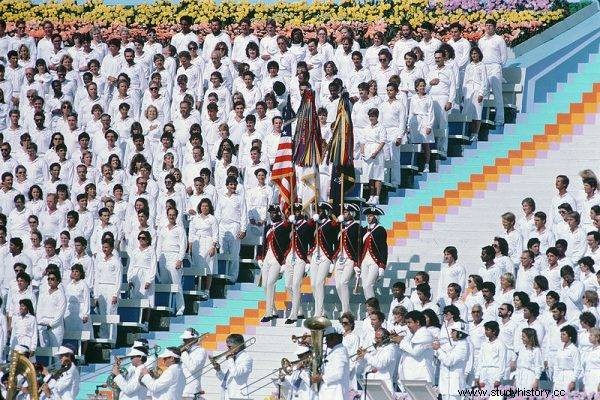
Every detail has been taken care of:a directed opening ceremony, a warm welcome to the participants, a concert on 84 pianos, a speech by Roland Regan.
Before the start of the 1984 Olympics, marketing partners for the McDonald's network - one of the sponsors of the struggle - came up with the idea of giving away free items for every medal won by the United States . How did it work? When buying products offered by the chain, the customer received a scratch card with an Olympic event. When the US team won gold in the event, the buyers were given a Big Mac. If she won silver - chips. Bronze meant free soft drink.
People associated with McDonald's did not predict that the hosts would get 174 discs, and therefore customers will go to pick up gifts. Certainly, they would have distributed fewer of them if athletes from the USSR and other countries of the socialist bloc appeared in the "City of Angels" - after all, they were extremely strong in sports. It didn't, and it was all politics again.
Like Cuba to God, so God to Cuba
A few months before the start of the Games, Soviet fighters shot down a South Korean plane carrying 269 people. Protests broke out all over the world and there were demands for the Soviets to be thrown out of the Olympic competition. Subsequently, the Americans did not issue a visa to the Russian sports attaché.
It was enough for the Olympic Committee of the USSR on May 8, 1984 to issue a statement that Soviet athletes would not go to the United States. The main reason for their absence was to believe that Los Angeles is dangerous, that this is a city of criminals, anti-Soviet. and the hosts cannot guarantee the safety of the guests. In addition, there were complaints in Moscow about the smog in the City of Angels. And yet the health of players, coaches and activists was the most important. Seemingly.
There is no doubt that the decision was politically motivated. It was a form of revenge against the Americans who did not show up in Moscow in 1980. Moreover, Soviet politicians also carried out an action to internationalize the boycott. Most of the countries of the communist bloc showed solidarity in the USSR. The Romanians broke away, who by the way became the revelation of the 1984 Olympics - they took second place in the medal standings. Athletes from Yugoslavia and China also traveled to the USA.
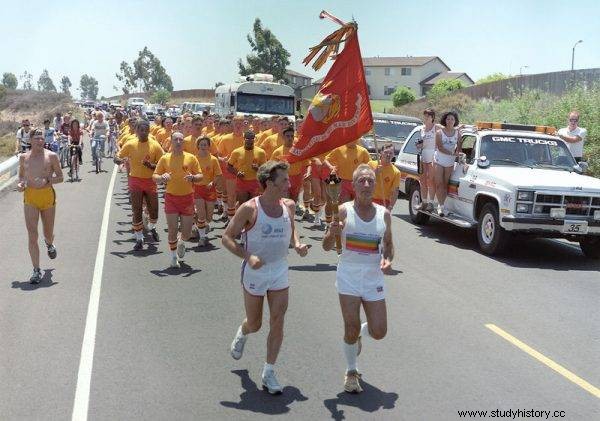
In 1980 and 1984, the main victims of the boycotts were athletes and fans.
The Poles did not oppose Moscow's will. On May 17, 1984, the Polish Olympic Committee issued a statement in which it informed:
After a comprehensive discussion and taking into account all elements of the situation around the Los Angeles Olympics Polish Olympic Committee decided not to submit the representation to participate in these Games . We are fully aware that this decision is unpleasant for players, but also for millions of sports fans in our country.
Some athletes opposed the ruling of the Polish Olympic Committee. Janusz Pyciak-Peciak, Irena Szewińska and Maria Kwaśniewska expressed their regret that the white and red would not go to California. When the emotions subsided, some players wondered whether they should go to the USA on their own. They were quickly brought to earth:such a journey could be the last one in their career, and after a possible start in the Olympic competition, it would be difficult for them to continue their careers in Poland. Moscow decided. Instead of Los Angeles, they went to several cities in Eastern Europe, where alternative competitions were held, proudly called "Przyjaźń-84".
In 1980 and 1984, the main victims of the boycotts were athletes and fans. Before both events, the former prepared the highest form to find out a few weeks before the start that it was not needed. The latter ones sharpened their teeth at the start of the giants, and often received one-sided spectacles. Politics then won over sport. Only in 1988, in Seoul, after a twelve-year break, the "two worlds" again competed with each other at the Summer Olympics. As it turned out later, it was their last fight.
Bibliography
- Górski, K. Bazylow, M. Petruczenko, Behind the scenes of the Olympics:from Athens to Barcelona, Warsaw 1992.
- M. Kobierecki, The boycott of the Olympic Games in Moscow as an example of political use of sports events , Lublin 2016.
- Pasko, Recreational sport in state policy 1944-1989 , Krakow 2012.
- Lipoński, Olympism for everyone , Poznań 2000.
- Ufel, Revenge for Moscow , Przegląd Sportowy Historia, No. 73, p. 7.
